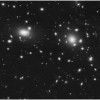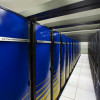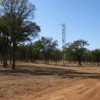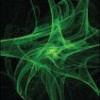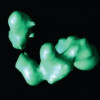News Archive
NERSC’s Deep Sky Project Provides a Portal into Data Universe
Every night approximately 3,000 astronomical files flow to the National Energy Research Scientific Computing (NERSC) Center from automated sky scanning systems all over the world for archiving. After a decade of collecting, the center currently holds over 8 million images, making this one of the largest troves of ground-based celestial images available. Read More »
Berkeley Lab Checkpoint Restart Improves Productivity
A combustion researcher may run a huge simulation of a laboratory-scale flame experiment on a supercomputer to better understand the turbulence-chemistry interactions that affect fuel efficiency. But if the system crashes, then all the data from the run is lost and the user has no choice but to start over. Read More »
Green Flash Project Runs First Prototype Successfully
Berkeley Lab’s Green Flash project, which is exploring the feasibility of building a new class of energy-efficient supercomputers for climate modeling, has successfully reached its first milestone by running the atmospheric model of a full climate code on a logical prototype of a Green Flash processor. Read More »
Above the Clouds: A Berkeley View of Cloud Computing
Hoping to emulate the influence of the report “The Landscape of Parallel Computing Research: A View From Berkeley” from the University of California Berkeley Electrical Engineering and Computer Sciences (EECS) Department’s Parallel Computing Laboratory (Par Lab), a group of a dozen faculty and grad students in the EECS Reliable Adaptive Distributed Systems Laboratory (RAD Lab) spent six months brainstorming about the impact and future directions of “cloud computing.” David Patterson, who has a joint appointment as a researcher in Lawrence Berkeley National Laboratory’s Computational Research Division, was one of the leaders of both projects. Read More »
New Tools Mobilize Local Data to Study Global Environmental Issues
As they strive to develop effective strategies for guarding water supplies, protecting endangered species and curbing greenhouse gases, environmental scientists are turning to innovative cyber-infrastructures and data-mining tools developed by an ongoing collaboration between researchers at Lawrence Berkeley National Laboratory, Microsoft Research, and the University of California, Berkeley. Read More »
Method enables bigger models of minuscule molecular systems
Imagine that the only way to appreciate the beauty of a Ming vase was to shatter it into a thousand pieces, examine the shape and color of each piece, then glue it back together – here’s the hard part – so it’s impossible to detect the seams. Read More »
Scaling the Nanowire
The preeminent physicist-futurist Richard Feynman famously declared in a 1959 address to the American Physical Society that “there’s plenty of room at the bottom.” He then invited them to enter the strange new world of nanoscale materials, none of which had actually been invented, except in Feynman’s fantastical imagination. Read More »
DOE CSGF Practicum Profile: Julianne Chung
Julianne Chung has an appreciation for versatility, starting with her academic interests. She showed an aptitude for mathematics at an all-girls high school in her hometown of Chattanooga, Tenn., but Chung has a love for dancing that dates back even further. She followed both interests and graduated in 2004 from Atlanta’s Emory University with a major in mathematics and a minor in dance and movement studies. Read More »
FastBit: Digging through databases faster
Imagine trying to find someone in a New York City telephone book if the names were listed randomly. Read More »
Humanities and High Performance Computers Connect at NERSC
High performance computing and the humanities are finally connecting — with a little matchmaking help from the Department of Energy (DOE) and the National Endowment for the Humanities (NEH). Both organizations have teamed up to create the Humanities High Performance Computing Program, a one-of-a-kind initiative that gives humanities researchers access to some of the world’s most powerful supercomputers. Read More »







 Instagram
Instagram YouTube
YouTube